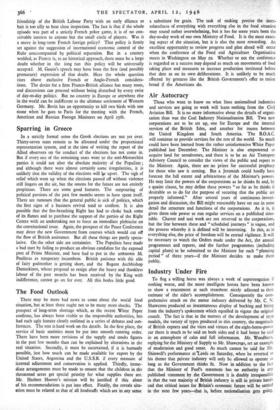Sparring in Greece
In a strictly formal sense the Greek elections are not yet over. Thirty-seven seats remain to be allocated under the proportional representation system, and at the time of writing the report of the Allied observers on the conduct of the elections has not come in. But if every one of the remaining seats went to the anti-Monarchist parties it could not alter the absolute majority of the Populists ; and although there were almost certainly some irregularities, it is unlikely that the validity of the elections will lie upset. The sigh of relief which went up when the elections passed off without violence still lingers on the air, but the omens for the future are not entirely propitious. There are some good features. The outpouring of political passions of the past few months seems to have spent itself. There are rumours that the general public is sick of politics, which the first signs of a business revival tend to confirm. It is also possible that the fire-breathing Right has had to choke back some of its flames and to purchase the support of the parties of the Right Centre with an undertaking not to force an immediate plebiscite on the constitutional issue. Again, the prospect of the Peace Conference may deter the new Government from courses which would cut oft the flow of British assistance. But all these things are partly specu- lative. On the other side are certainties. The Populists have made a bad start by failing to produce an obvious candidate for the exposed post of Prime Minister, and have had to put in the un_Dmown M. Poulitsas as temporary incumbent. British patience with the role of fairy godmother is getting short, and the Regent Archbishop Damaskinos, whose proposal to resign after the heavy and thankless labour of the past months has been received by the King with indifference, cannot go on for ever. All this bodes little good.


























 Previous page
Previous page